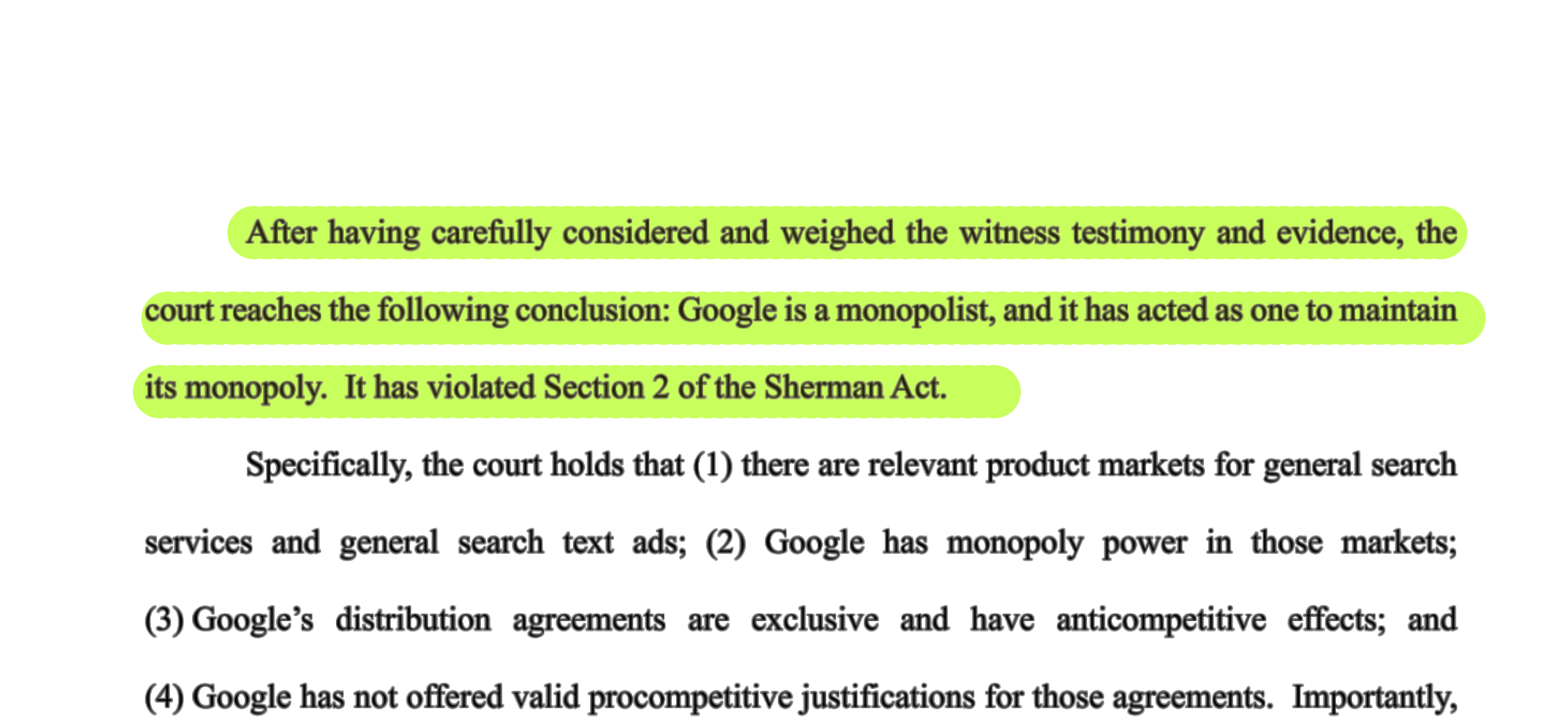$26.3 Billion: The most revealing stat in this week's Google antitrust ruling
The most interesting number in the trial concerns where most people do their Googling: on their phones.

Sign up to receive The Snapshot, a free special dispatch from Laptop Mag, in your inbox.
You are now subscribed
Your newsletter sign-up was successful
On Monday, Google was the subject of a history-making decision. It's the first major tech company since Microsoft in 2001 to be found guilty of antitrust-like behaviors.
In a lengthy ruling, Judge Amit Mehta, in a federal court in Washington, D.C., writes that Google abused its monopoly on search.
Having a monopoly is not illegal, but acting to keep one, in whatever form those actions take, often is illegal.
The most interesting number in the trial, however, concerns where most people do their Googling: on their phones.
How much would you pay to be the default search engine in 60% of mobile phones in the U.S.?
If you live in the U.S., there's more than half a chance you use an iPhone: An estimate in a Department of Justice complaint puts the number at 60% for Apple's iPhone market share in the U.S.
The amount of money that Google paid Apple to be the default search engine on iPhones in 2021 is an eye-wateringly high number, but if your phone controls more than half of the U.S. market, you can command a very high sum from Google.
Monday's ruling (read the full PDF of the ruling here) is the most significant part of a trial that ran from September to November 2023, and illustrates just how important one enormous sum — first revealed in October 2023 during the trial — became to the judgment.
Sign up to receive The Snapshot, a free special dispatch from Laptop Mag, in your inbox.
How Google got to $26.3 billion
The most interesting and essential part of the trial might be this number: $26.3 billion. In a slide revealed at the trial on October 27, 2023, Google paid $26.3 billion to browser companies, phone makers, and wireless carriers to be the default search engine.
The New York Times reported that "around $18 billion" was to Apple. The rest went to other companies like Samsung, LG, Motorola, and phone carriers like AT&T, T-Mobile, Verizon, and web browsers like Mozilla and Opera.
If you're curious, dig into the 2020 federal complaint against Google. It explains revenue-sharing agreements, or RSAs, wherein "Google generally requires exclusive distribution as the sole preset default general search service on an ever-expanding list of search access points."
In return, Google would pay those companies a percentage of advertising revenue from searches. It's worth noting here that Google also benefited from the data it collected on user behaviors and macro-search trends, which it could monetize via miscellaneous methods.
"Google is a monopolist"

Mehta in his ruling, is clear: “Google is a monopolist, and it has acted as one to maintain its monopoly."
In response to the ruling on Monday, Google's President of Global Affairs, Kent Walker, struck a slightly defiant tone:
“This decision recognizes that Google offers the best search engine, but concludes that we shouldn’t be allowed to make it easily available,” Walker said in a statement released to the press. “As this process continues, we will remain focused on making products that people find helpful and easy to use.”
Google has had a grip on search for more than a decade. In 2009, the ruling notes, nearly 80% of internet searches in the U.S. were through Google.
What's next for Google? More trials.
"Follow the money," that old journalism phrase borne out of the Watergate scandal, also rings true in the ruling: Where large sums are being exchanged, scrutiny may follow.
What's next? For Google, a lot.
For one, a new trial will be held to determine Google's punishment in this trial.
And in September, a new, different federal trial is scheduled to start, as the Department of Justice argues that Google’s advertising tech is an illegal monopoly.
MORE FROM LAPTOP MAG
- iPhone 16 could arrive early, but a missing feature might make you wait
- Asus Zenbook S16 vs. Vivobook S15: Ryzen AI 300 and Snapdragon X Elite showdown
- I tried the macOS Sequoia public beta — I’ve never been more productive on my Mac

Nick Lucchesi is a writer and editor who is the Editor-in-Chief for Laptop Magazine. He has worked in content marketing for technology companies and served in various leadership roles, including Editor-in-Chief at Inverse. He began his career as a daily newspaper reporter before criss-crossing the country as a web editor for alternative weekly newspapers. He lives in Brooklyn, New York.
